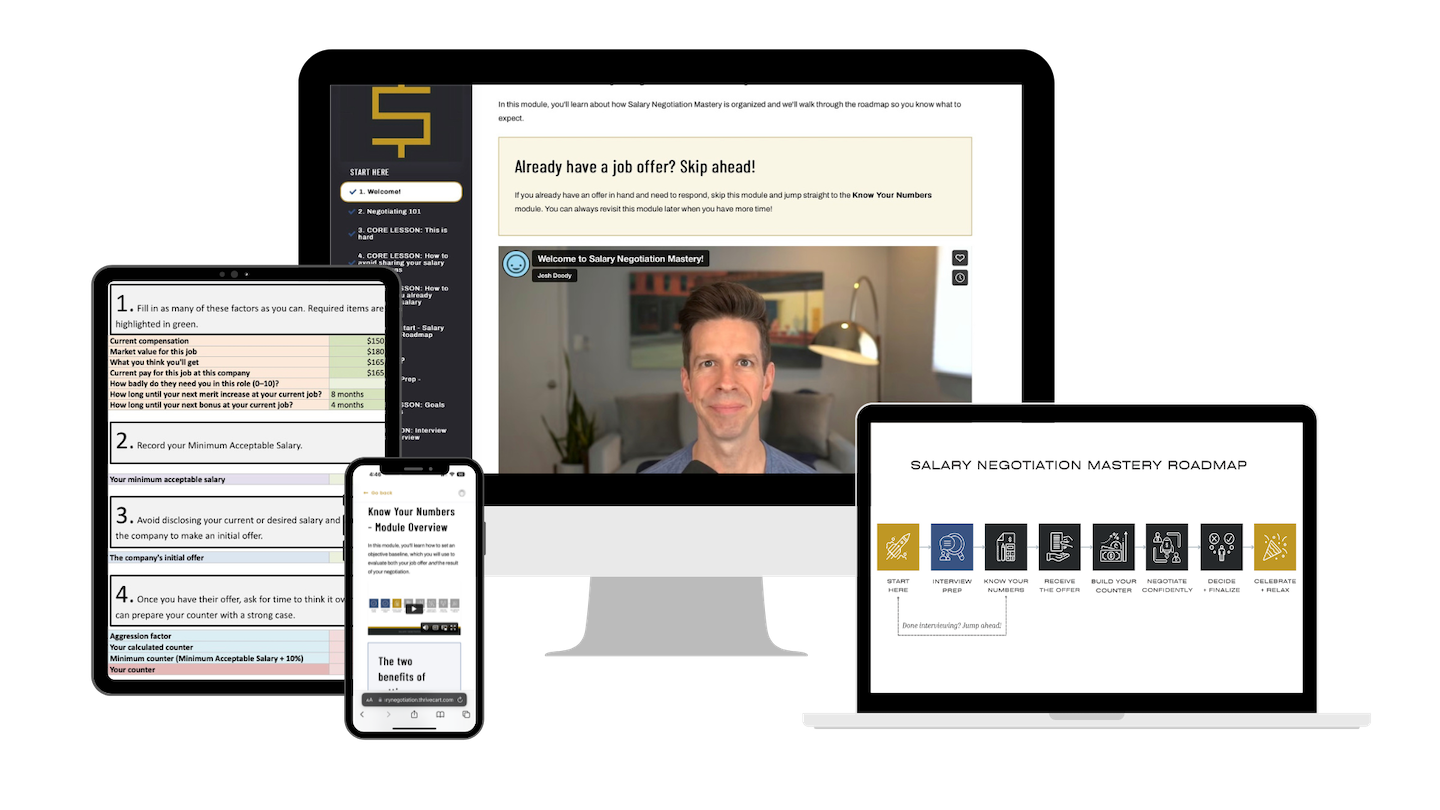Negotiating job offers
Do you need multiple competing job offers to negotiate?
Competing offers can help, but your greatest leverage is your unique value proposition
by Josh Doody
You have probably heard that having competing job offers can help you get more money by playing the companies off of one another. And sometimes you can!
But do you need competing job offers from multiple companies in order to negotiate at all?
No, and here’s why.
What is “leverage” in salary negotiations?
I’m a professional salary negotiator. It’s what I have done full time for many years now.
One of the most common words used by my clients is “leverage”.
Specifically, they wonder if they have enough leverage to negotiate their offer. When we dig into that question, what they usually mean is something like this:
Can I negotiate my job offer without other competing offers?
They wonder if they need other job offers to use as leverage to negotiate their current offer.
This is tricky because most people only get one job offer at a time. So if they do need competing offers as leverage, then most people are stuck.
Sometimes, they mean something like this:
Do I need compelling market data to negotiate my job offer?
They believe that if they ask for more money, they’re going to have to show their work: they’ll have to send data points showing that their request is justified by the salaries paid for similar roles at this company or other companies.
You already have the leverage you need
I have bad news and good news on the “leverage” front.
The bad news is that you do need leverage to negotiate.
The good news is that the kind of leverage you need has nothing to do with competing offers or market data.
Before we talk about the kind of leverage you need, let’s just define the word “leverage” in a salary negotiation context (and then I can stop putting it in quotes): Your “leverage” in a salary negotiation is something you—the candidate—bring to the negotiation that is unique and compelling to the company making you the job offer.
We typically think of leverage in terms of who has the upper hand in the negotiation—who has the most power to control the negotiation.
For the most part, the company has most of the leverage, and this is reflected in the way our society talks about jobs. Jobs are “created” and “offered” by companies, but they are”accepted” or “lost” or “terminated” for employees.
And if we list the unique and compelling things the company brings to the negotiation, it’s a long, pretty weighty list:
- Job opening(s)
- Budget
- Existing infrastructure
- Customers
It seems like they’re holding all the cards.
But, even though they are holding all the big cards, you are the one they’re offering the job to, right? In many respects, they need you as much as you need them. When we consider the costs of filling a job, the company will likely spend thousands or tens of thousands of dollars to find the right candidate. They’re not just spamming thousands of inboxes with job offers for this open role. Instead, they’re working through an intentional, scripted process to find the right candidate for the role. And they’re doing that at great expense in terms of money and time.
Yes, you’re spending quite a bit of your time applying and interviewing for this role, but they’re spending much, much more time and money than you are.
You don’t need multiple competing job offers to negotiate
For all those reasons, when you get a job offer, you have substantial built-in leverage associated with the job offer itself.
Going back to our definition of “leverage” earlier, your unique and compelling attributes are that you got this job offer and they need to fill it! You are unique enough to get the job offer, and their need to fill the role is compelling enough to have spent substantial time and money to get to the point where they could offer you the job.
Not only do you have substantial leverage, but this is your greatest source of leverage and it’s the main thing you should focus on in your negotiation.
The thing is that simply based on the fact that you received this offer, you are by definition unique (the only one or one of only a few people to get the offer) and compelling (you were aligned well enough with the job that they were compelling to offer it to you).
Your value proposition is your greatest leverage
Your job in the negotiation is to articulate and amplify why you are a unique and compelling candidate for this role.
This is where your “value proposition” comes in: What makes you uniquely valuable in this role such that the company decided to offer you the job?
That is your leverage!
And you’re the only person with your resume and skillset. Only you can offer specifically what you can offer to this company for this role.
So when you negotiate, focus on how you can help the company, or the team, or even your hiring manager accomplish their goals and overcome the challenges they’re facing. They must have goals to accomplish or challenges to overcome because they’re spending significant time and money to fill this job.
Other forms of leverage might sometimes help you negotiate
That’s not to say that competing offers, market data, your pending promotion, your unvested equity, and other similar things don’t offer any sort of benefit—leverage—in your negotiation. It’s just to say that they’re not necessary to negotiate.
They’re almost always most useful as backup sources of leverage. You can negotiate based on your value proposition and it might help to mention those other things.
In this way—as a secondary source of leverage—competing job offers can be helpful. If you happen to have multiple job offers at the same time, there are two ways you might use them as leverage.
Implicit leverage
By simply mentioning the fact that you have other job offers, you can apply some pressure to the company whose offer you’re negotiating. This can be subtle and is pretty much binary: either you have at least one other offer in the works, or you don’t. If you do, that’s a motivating factor for the company to play ball when you negotiate.
This is because they now realize they might have to work harder to persuade you to join.
In this case, you don’t even need another offer in hand. All you need is a potential offer—an “opportunity” that you’re considering—to apply some pressure. In fact, the potential competing offer can often be more valuable than an actual competing offer because it’s possible your competing offer will eventually be objectively inferior to the offer you’re negotiating.
Here’s what I mean—look at the difference in these two negotiating positions:
“You offered [offer amount], and I would be more comfortable if we can settle on [counter offer amount], which would help me feel good about discontinuing my ongoing discussions about other opportunities.”
…compared with…
“You offered [offer amount], which is actually more than the other offer I have in hand, and I would be more comfortable if we can settle on [counter offer amount] so I can join this team.”
Of course, you would never actually counter offer with that language because it’s so weak. But that’s basically what’s happening when you’re using an inferior offer as leverage for an offer you want.
So it is often the case that the maximum implicit leverage of a competing offer is available before the offer itself has materialized. The threat of a potentially-superior offer is sometimes better than the actual competing offer.
Explicit leverage
Which brings us to explicit negotiating leverage when you have a competing offer.
As I mentioned earlier, I’m a professional salary negotiator. My livelihood depends on my salary negotiation coaching clients getting good results, partially because most of my income depends on how much we improve each offer. Meaning: When my clients negotiate higher pay, I also get higher pay.
So it’s 100% in my best interest to do everything I can—to use every edge, every source of leverage—to help my clients negotiate the absolute best compensation package possible.
And yet, I basically don’t care if they have competing offers or not. Why?
This is why. Because the opportunity to use a competing offer as explicit leverage is so rare that it’s almost not even worth worrying about. When I break it down, I think you’ll agree.
I’m assuming that the reason you want to use a competing offer as leverage is that you really want to go to a firm whose offer is less than an offer you have from another firm (because otherwise, why not just negotiate directly with the firm who has made the better offer?).
Here are the things that need to be true in order to use one or more competing offers as your primary leverage for an offer you want to negotiate:
- One or more of the competing offers has to be better than the offer you’re trying to negotiate.
- The company making the offer you’re trying to negotiate has to care enough about the competing offer to respect it and try to “match” it.
- The competing offer amount and firm need to be more compelling than your unique value proposition.
- The competitors have to be competing in terms of what they produce and in terms of their financial resources.
When all three of those things are true, then you might be able to use a competing offer as leverage to improve the offer you’re negotiating.
This happens most often when direct competitors with deep pockets are competing for scarce talent. Think “two big tech companies are competing for a Machine Learning Engineer with a specific type of expertise”.
When does this break down?
If the offer you really care about is already superior, it doesn’t work very well.
If the competing offer you have is from a firm who doesn’t directly compete with the firm who made your primary offer, it doesn’t work very well.
If the offer you really care about is from a firm that simply can’t afford to compete head-to-head with your other offer, it doesn’t work very well. (A mom-and-pop startup in a small town is almost certainly not going to have the financial resources to compete with an offer from Google.)
So, can you use a competing offer as explicit leverage to improve a primary offer that is your preferred job? Yes! But only when the stars align as I described above.
Otherwise, the best you can hope for is “implicit” leverage, which is simply less compelling than your unique value proposition (the reason you got offered the job in the first place).
Wrapping up
So, do you need multiple competing job offers as leverage in order to negotiate an offer?
No. The most compelling leverage you have is your unique alignment with the role that you have been offered—your value proposition. Focus on that in your negotiation.
If you happen to have multiple offers, that can be a source of leverage—implicit or sometimes explicit—but that is rare and is absolutely not necessary to negotiate your job offer.
Articles you may also like
- A salary increase letter to ask your boss for a raise
- Got a job offer from Amazon? Learn how to negotiate your salary
Learn more Make sure you have everything you need for your next interview

